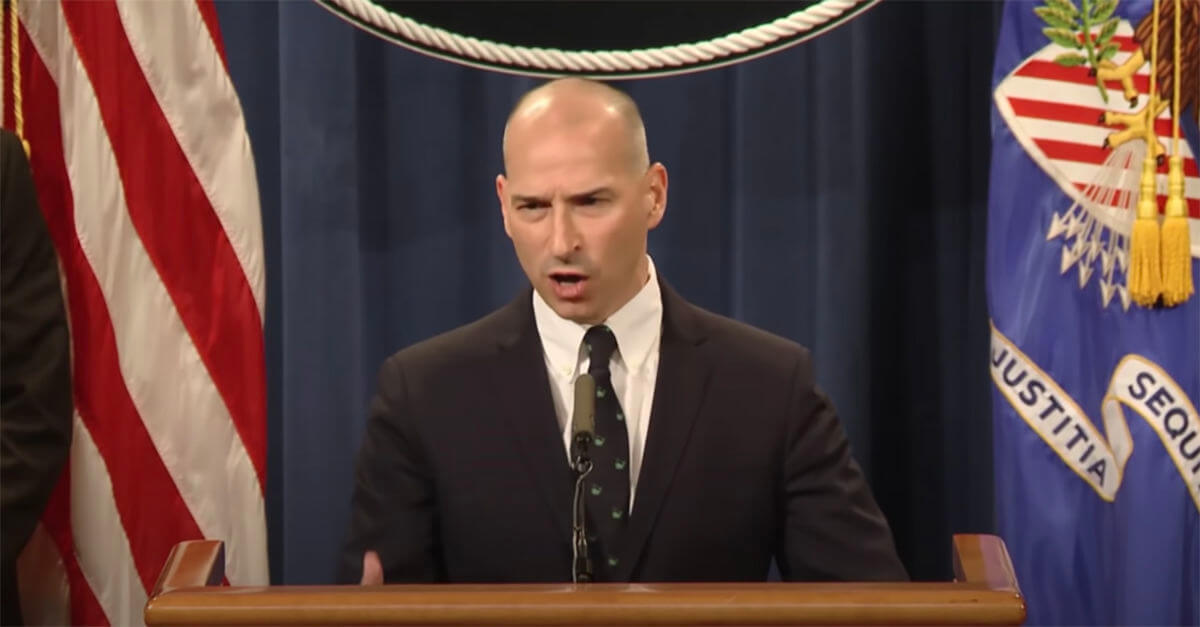
Michael R. Sherwin ’98J.D. was on the National Mall in Washington, D.C., on January 6 as the large crowd listening to speeches about the outcome of the presidential election started moving toward the U.S. Capitol. He walked along, watching as the crowd became more agitated, then as people started climbing the scaffolding. Then he went to work.
Sherwin, a former Navy intelligence officer who served in Iraq and Afghanistan, was acting U.S. attorney for the District of Columbia from May 2020 until March 3 of this year, filing the initial criminal charges against individuals who participated in the January 6 insurrection. He’s now special counsel for the investigation of the Capitol riot, reporting directly to Attorney General Merrick Garland. More than 400 individuals so far have been charged.
On March 17, Sherwin discussed his pursuit of justice in the aftermath of the Capitol breach via Zoom with Notre Dame Law School Professor Jimmy Gurulé.
Selections from Sherwin’s remarks:
On (January 6), my morning started very early. I was with a deputy chief of the (Washington Metropolitan Police Department) at 7 in the morning, Deputy Chief Parsons. And I was at the Ellipse, where all the speeches were. I just wanted to observe, on patrol with the police, who was coming in.
There were certain pockets of people that weren’t typical protesters. You could see them (attired) like they were in Iraq or Afghanistan. They had the Kevlar vests and military helmets. And there were pockets of these people. Those people I thought were very curious and the police did, too. Those people ended up being some of the militia members we charged: the Oath Keepers, the Three Percenters, the Proud Boys.
They weren’t doing anything illegal (at the Ellipse rally), but those were the individuals that I saw personally peel off before the speeches were done and then migrate towards the Capitol. And then the momentum built at the front of the Capitol. I was there when it became more and more agitated, thousands of people started going towards the west side. When people started climbing the scaffolding is when I left. I went right to the U.S. attorney’s office. I called the FBI station chief, and then I called my first assistant and said this is going to be a long day. Within the next couple hours is when the siege happened.

What made this case so unusual and unprecedented in U.S. history is the fact that never before did we have such a large crime scene with literally thousands of witnesses and hundreds, if not over a thousand, potential subjects and defendants.
There was such a confusion that very few of these individuals were arrested when they left, because the objective with the Capitol police was to clear the Capitol so the electoral count could continue. This was just such a unique circumstance on the 6th that was never really seen before in U.S. history. And the fact that people scattered afterwards and went literally to every state in the union has obviously made the prosecution a little more difficult than a typical case.
There are 56 FBI field offices in the United States. I think this is the first case where every single field office has been involved in arrests.
I wanted to ensure that there was shock and awe in some of the charging, where we could charge as many people initially as we could, to ensure that people would know if they came back (to D.C.) and they did anything criminal or anything out of the ordinary, they would be charged. Because we wanted to mitigate people coming back before (the presidential inauguration on January 20). So (trespassing and other minor offenses were among the early charges filed), but then we indicted with felonies and the majority of the charges in these cases are federal felonies with five-, 10-, 20-year penalties under federal law.
The initial few weeks were, I call them the one-off cases. The internet stars, given that they were essentially just thumbing their nose at the public. The rebel flag guy, the guy that went into (Nancy) Pelosi’s office and put his legs up on her (desk) and stole stuff from her office . . . the guy with the Camp Auschwitz (sweatshirt). These were all the internet stars of the first few days that I wanted to target and take down immediately to show the public what they did was egregious and that would not be stood for.
The criminal code is the same criminal code that I was using during the Trump administration and that I’m using now when I’m working for Garland. And divorce the politics. We are just looking at the conduct and I don’t care who you are: If you’re a government official, if you’re a civilian, if you’re a cop, if you’re an ex-cop, if you’re former military. We’re looking at your conduct and what you did, divorced of politics, divorced of your gender. If you committed a crime . . . we’re going to charge you.
Margaret Fosmoe is an associate editor of this magazine.